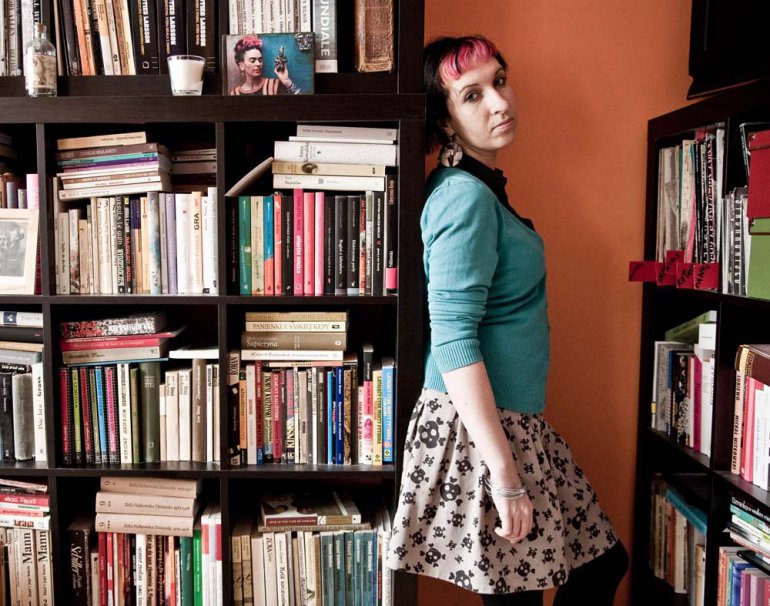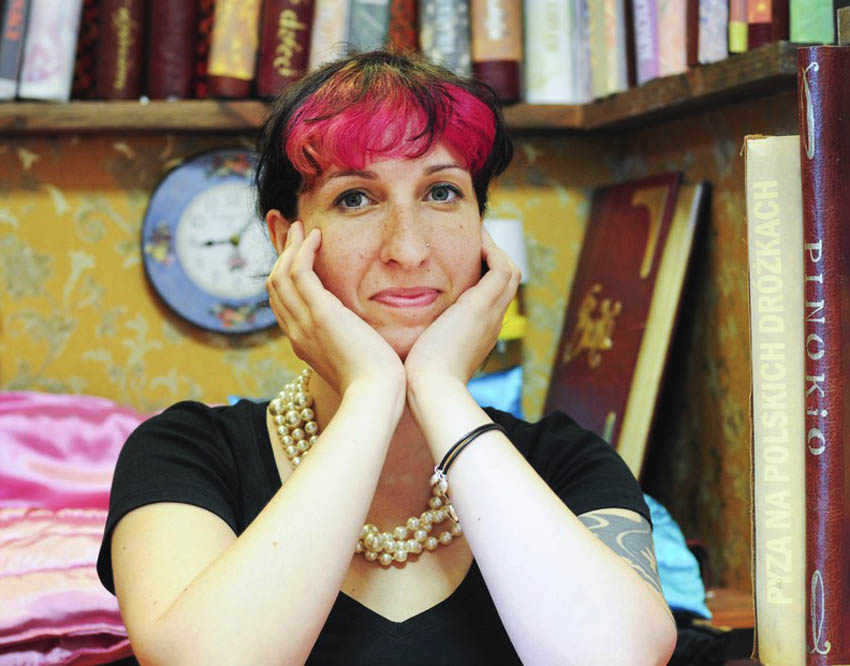Chutnik is a prolific writer and a prominent social activist. She directs the MaMa Foundation, which she helped found to improve the situation of mothers in Poland, from work initiatives to train facilities, and is a member of other socially-minded groups. She is a laureate of the Lady of Warsaw 2007 competition and won the Wawoactive 2008 contest, organised by the newspaper Życie Warszawy. She was nominated for the Nike literary prize in 2009. Chutnik was presented with the Ashoka Prize the same year, the so-called social workers’ Nobel, granted by Ashoka, the international organization, for efforts contributing to the building of civil society.
Literary debut, and the Polityka Passport Award
She debuted with the book Women’s Pocket Atlas in 2008 and was awarded the prestigious Polityka Passport Award in 2009. Women's Pocket Atlas has been translated into Czech, German, Lithuanian, Russian and Slovakian. In it, four women narrate stories linked to the Opaczewska Street area in Warsaw, mentioned in a patriotic poem written in September 1939 that opens with the words 'I am the evil street'.
'Bazaarians', the opening chapter, presents a bazaar as a place of gender equality, where saleswomen may even hold the advantage: 'It’s a temple, the only one in the country, where women are allowed to be priests. They may select products, comment and observe on the same terms as men'. Chutnik presents a typology of women marketeers, the Queens, Bazaarians, Hens, Polish Mothers, Housewives and Gastronomical Mothers. 'Connectors' starts with a daring description of a queue in a medical centre, that changes fluently into the memories of Maria Wachelberg, a liaison officer in the Warsaw Uprising during the Second World War. Raped by Germans, Wachelberg suppressed her memories from the Warsaw Ghetto Uprising and never used her real name in fear of anti-Semitism. The character-classification scheme returns in a litany of the Dead Woman, the Cemetery Widow, Mother Earth, the City’s Mother and the Rotten Lady, who lives in a basement. The epithets allude to the Catholic Litany of Loreto from the 16th century – Chutnik assumes the language of religion, naming her main characters Maria. In 'Counterfeits', the third chapter, the transsexual Marian is a partial exception. Then 'Princesses' tells the rebellious 11-year-old Marysia Kozak's story: 'Marysia bent down by the curb and spit on her finger. She wiped the sand and dirt of the street with it. Later she rubbed her hand on the inner side of her clothes with fervour. Everything seemed clean, but underneath it was a nightmare'. The circular structure of Women's Pocket Atlas ends where it began, with Marysia setting the bazaar on fire.
Diddums, and the Controversy in a Her-story
Chutnik’s writing is deeply rooted in feminist theories and cultural gender concepts. The character Mr.-Mrs. Roman appears in Women’s Pocket Atlas, and the novel Diddums (Dzidzia) from 2010 echoes this aptly named her-story (a story written from women’s perspective, updating the gender identification in history, and its traditional male domination). The novel reveals a significant Polish paradox about children in combat, a point of national pride in discussing the Warsaw Uprising in 1944 that is rejected as cruelty in the context of today's conflicts. Chutnik conducts a similar deconstruction of patriotism in her short story Poor Children Look at Poor Adults, part of the anthology Don’t Ask About Poland (AMEA, Liszki 2009).
The poet and writer Agnieszka Wolny-Hamkało regards Diddums as a 'dramatic appeal for a Poland, which would finally shake off the corpses, guilts and punishments'. Literature based on such assumptions stirs up intense controversies, evident in the novel's contradictory reviews. Diddums traces a story of revenge in Gołąbki, a village near Warsaw. Stefania Mutter informs on two Polish women to the German occupiers, condemning the women to death. Half a century later, Stefania's granddaughter Danuta gives birth to Dzidzia, or Diddums, physically deformed and mentally handicapped.
 Sylwia Chutnik, photo: Rafal Siderski / Forum
Sylwia Chutnik, photo: Rafal Siderski / ForumConsidered a shocking story of the Polish national character – complex, naive, even stupid – critics charged the young author with tackling intractable traumas of history, patriarchy, religious hypocrisy. The newborn Diddums stands for Poland itself, crippled and demented, yet it calls for Poles to shake off history's shackles and be born anew, confronting the martyrdom canon with the symbolism of the Polish mother.
The novel’s language is grotesquely distorted, its plot even more so. The retarded child is used in medical experiments and repeats twisted, fragmentary wartime memories. The author comments on this laconically: 'History grinds itself in a disabled girl. This medium is appropriate for this history'. The book then focuses on disability, exclusion and religiosity concentrated on suffering, and on conflicts between the city and the countryside. It culminates in the lynching of the girl, who tries to escape from church, where she had been placed by social workers who saw her as a saint. The book integrates poetical language – one chapter, "The Great Improvisation", references the famous monologue in Adam Mickiewicz’s Dziady / Forefather's Eve – with physiological explicitness and a deliberate strategy of addressing controversial issues.
Journalism, and the Women of Warsaw
Chutnik is perfectly conscious of her work's media profile. Her texts have appeared in such volumes as Woman and Politics, Feminism’s Queering, People, Cities. Literature of Belarus, Germany, Poland and the Ukraine and in the anthology of young Poles' prose, I’d Rather Not.
 Sylwia Chutnik, 2012, photo: Włodzimierz Wasyluk / Reporter
Sylwia Chutnik, 2012, photo: Włodzimierz Wasyluk / ReporterAlong with her literary work and articles, Chutnik published her city guide Women’s Warsaw (Warszawa Kobiet) in 2011. With sections about each of the city's major sectors based on her extensive work as a guide, the book focuses on women who made Warsaw their home and on their influence on the city. ('Another interesting place in Rakowiecka street […] is St. Andrzej Bobola’s church at number 61. There one can find very interesting stained-glass windows designed by Teresa Reklewska'.) It includes her essays written for periodical publication. Anecdotes range from the historic Różycki bazaar in Praga and the dumplings sold there to Zofia Nałkowska's controversial speech at the Warsaw Women’s Convention in 1907 and Maria Skłodowska-Curie's death from radiation. Chutnik conducts anthropological observations of marketplace trade, addresses the lack of women's topics in school curriculums, expresses concerns about suppressing of the subject of the human body. Her almost poetic sentence about the great scientist and two-time Nobel laureate, born in Warsaw, reads: 'Maria drinks radium and becomes her own invention. She doesn’t need her body anymore'.
Chutnik's next book, Scallywags (Cwaniary) takes a casual approach to today's Warsaw, turning the shadows of the city streets into a comic-book vision of violence and feminist vendetta. The book was published in November 2012. Emilia Konwerska wrote:
Cwaniary is a writing on the dump, on a grey wall, but taken into the world of literature. In Sylwia Chutnik's new novel we get a gender knife-fight, admiration towards Warsaw and its less official side, as well as punk-rock ideals ("Dwutygodnik", 11.2012).
A collection of short stories entitled In Wonderland was published two years later. It's a description of everyday life: quite mediocre characters who have to cope in unusual situations. Stories take place in bad neighbourhoods among shabby backyards and stairways. The author's social engagement is evident: one has to remember she's also an activist and a city guide. For this book, Chutnik was nominated for the Nike award in 2015.
In 2015 Jolanta was published. It's a ballad about a woman from Warsaw's Żerań district, who cannot fit into any of the roles assigned to her. As critics noted, it shows Chutnik's consequence: her favourite subject is, as always, a Woman, a City and History. It's a realistic novel, describing the time of the Polish political transformation. Maciej Robert wrote:
The description of the political turning point is especially interesting – from the time of the communist hopelessness decorated with colorful tins put on the shelf to economical lawlessness of the 1990s. Jolanta, who cannot fit into the adults' world, and with her view on life summed up in the spell "not to speak, not to trust, not to feel", is an emblem of destructive traumas, passed on from generation to generation. Time and place have also played their part ("Polityka", 15 Sep 2015).
In her Black Market Moneychanger (Cinkciarz, trans. AP), Chutnik transposes a mystery murder case from Sopot to the 1980s. However, the plot unfolds in Warsaw, illuminated by lights coming from discos attended by hoodlums. Maciej Robert notes:
Chutnik treats the intrigue as a pretext. She’s more into painting a psychological portrait of the protagonists – not just the perpetrator and the victim but the entire society. Conveying the spirit of the 1980s is key to it (Polityka, 22 Nov. 2016).
Apart from writing, Chutnik also boxes. In her 2017 Women Who Fight: Conversations with Fighters she combines the two passions. She interviewed female martial artists – fighters and coaches as well as amateurs.
Author: Paweł Kozioł, June 2011. Translated by Marek Kępa. Updated by AP, February 2019.
Selected works of prose and non-fiction
- Women’s Pocket Atlas, Ha!art Corporation, Cracow 2008;
- Dzidzia / Diddums, Świat Książki, Warsaw 2009;
- Warszawa kobiet / Women’s Warsaw, Polityka, Warsaw 2011;
- Cwaniary / Scallywags, Świat Książki, Warsaw 2012;
- Jolanta, Znak, Kraków 2015;
- Smutek cinkciarza, Od deski do deski, Warszawa 2016;
- Kobiety, które walczą: Rozmowy z zawodniczkami sztuk walki, W.A.B., Warszawa 2017.
Anthologies and group publications:
- Feminism’s Queering. Aesthetics, Politics, or More?, ed. Joanna Zakrzewska, Women’s Society CONSOLE, Poznań 2006;
- People, Cities. Literature of Belarus, Germany, Poland and Ukraine, ed. Piotr Marecki, Renata Serednicka, Igor Stokfiszewski, Ha!art Corporation, Kraków 2008;
- I’d Rather Not, ed. Grzegorz Jankowicz, Ha!art Corporation, Kraków 2009 (short-story anthology);
- Don’t Ask about Poland, ed. Beata Rudzińska, AMEA Publishing House, Liszki 2009;
- NieObcy, ed. Karolina Oponowicz, Stowarzyszenie Przyjaciół Polskiej Akcji Humanitarnej, Warszawa 2015;
- Warszawa, Pascal, Bielsko Biała 2017;
- 20 rzeczy o Warszawie, ed. Agnieszka Rasmus-Zgorzelska, Muzeum Warszawy, Warszawa 2017;
- Dowód dojrzałości, ed. Sylwia Chutnik, BANDI Cosmetics, Czosnów 2018
- Dino Bambino, Wytwórnia, Warszawa 2018
- Inne światy, ed. Joanna Mika, Sine Qua Non, Kraków 2018;
- Przecież ich nie zostawię. O żydowskich opiekunkach w czasie wojny, ed. Monika Sznajderman, Magdalena Kicińska, Czarne, Wołowiec 2018;
- Powstanie '18. Opowiadania Wielkopolan, Urząd Marszałkowski Województwa Wielkopolskiego, Poznań 2018.